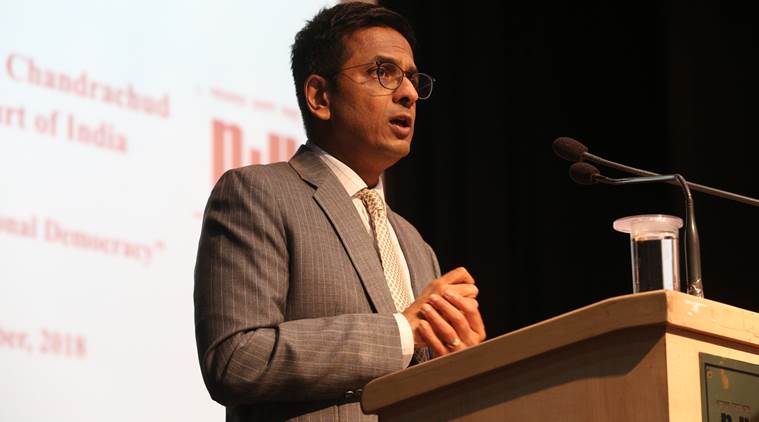From the way it was passed as a Money Bill to its provisions that curtailed fundamental rights, the Aadhaar Act came in for blistering criticism from Justice D Y Chandrachud.
Accepting the Government’s contention that there needs to be an ID system for targeted delivery of welfare benefits, Justice Chandrachud said that the state had failed to show that this entails sacrifices on “individual autonomy, data protection and dignity.”

Also Read | Supreme Court gives Aadhaar some privacy
Writing the dissenting opinion in the 4-1 verdict, Justice Chandrachud struck down the law on the grounds that “(the) entire Aadhaar programme, since 2009” suffers from “Constitutional infirmities and violations of fundamental rights”.
Saying that it failed to qualify as a money Bill under Article 110, Justice Chandrachud said that the “ruling party in power may not command a majority in the Rajya Sabha” but “superseding the authority of the Rajya Sabha is in conflict with the Constitutional scheme and the legitimacy of democratic institutions.”
Also Read | Private firms (banks and phones) can’t ask for Aadhaar linking
The judge minced few words: “It constitutes a fraud on the Constitution. Passing of a Bill as a Money Bill, when it does not qualify for it, damages the delicate balance of bicameralism which is a part of the basic structure of the Constitution…The Lok Sabha cannot introduce and pass a legislative measure in the garb of a Money Bill, which could otherwise have been amended or rejected by the Rajya Sabha. Bicameralism is a founding value of our democracy. It is a part of the basic structure of the Constitution. Introduction and passing of a Bill as a Money Bill, which does not qualify to be a Money Bill under Article 110(1) of the Constitution, is plainly unconstitutional.”
Full Text | Supreme Court Aadhaar judgment
There is a “legitimate state aim” in maintaining a system of identification to ensure that welfare benefits reach beneficiaries without diversion, he said, but “one right cannot be taken away at the behest of the other.”
Story continues below this ad
The state has failed to satisfy the court that “targeted delivery of subsidies which animate the right to life entails a necessary sacrifice of the right to individual autonomy, data protection and dignity when both these rights are protected by the Constitution.”
READ | Congress to move Supreme Court for upholding passage of Aadhaar Act as money bill
“The technology deployed in the Aadhaar scheme reduces different constitutional identities into a single identity of a 12-digit number and infringes the right of an individual to identify herself/himself through a chosen means. Aadhaar is about identification and is an instrument which facilitates a proof of identity. It must not be allowed to obliterate constitutional identity…The entire Aadhaar programme, since 2009, suffers from constitutional infirmities and violations of fundamental rights. The enactment of the Aadhaar Act does not save the Aadhaar project. The Aadhaar Act, the Rules and Regulations framed under it, and the framework prior to the enactment of the Act are unconstitutional,” he said.
He pointed out that biometric technology, which is the “core” of the Aadhaar programme “is probabilistic in nature, leading to authentication failures”. These failures have led to denial of rights and legal entitlements, he said.
Story continues below this ad
“Dignity and the rights of individuals cannot be made to depend on algorithms or probabilities. Constitutional guarantees cannot be subject to the vicissitudes of technology. Denial of benefits arising out of any social security scheme which promotes socio- economic rights of citizens is violative of human dignity and impermissible under our constitutional scheme,” he said.
“The invisible threads of a society networked on biometric data have grave portents for the future. Unless the law mandates an effective data protection framework, the quest for liberty and dignity would be as ephemeral as the wind,” he said.
On data protection, Justice Chandrachud pointed out that the architecture of Aadhaar failed to provide for an independent monitoring authority answerable to Parliament. “In the absence of a regulatory framework which provides robust safeguards for data protection, the Aadhaar Act does not pass muster against a challenge on the ground of Article 14 (right to equality). The law fails to meet the norms expected of a data protection regime which safeguards the data of 1.2 billion Indians,” he said.
READ | Amid lone dissent note, a look back on Aadhaar introduced as Money Bill
Story continues below this ad
He observed that UIDAI, which is controlled by the Union Government “possesses neither the autonomy nor the regulatory authority to enforce the mandate of the law in regard to the protection of data.”
On the contentious Section 57 of the Act, which allows private entities to use Adhaar numbers, Justice Chandrachud said that this “will lead to commercial exploitation of the personal data of individuals without consent and could also lead to individual profiling” and so it violates Articles 14 and 21 (protection of life and personal liberty) of the Constitution.
“Profiling could be used to predict the emergence of future choices and preferences of individuals. These preferences could also be used to influence the decision making of the electorate in choosing candidates for electoral offices. This is contrary to privacy protection norms,” Justice Chandrachud said.
“In the modern digital era, privacy protection does not demand that data should not be collected, stored, or used, but that there should be provable guarantees that the data cannot be used for any purpose other than those that have been approved.”
Story continues below this ad
READ | How Supreme Court accepted govt’s argument on Aadhaar as Money Bill
He said that Section 7 of the Act, “suffers from over breadth” since “the broad definitions of the expressions ‘services and ‘benefits’ enable the government to regulate almost every facet of its engagement with citizens under the Aadhaar platform.”
He also pointed that linking Adhaar to mobile SIM cards “poses grave threats to individual privacy, liberty and autonomy”.
“Mobile phones are a storehouse of personal data and reflect upon individual preferences, lifestyle and choices. The conflation of biometric information with SIM cards poses grave threats to individual privacy, liberty and autonomy.”

 Justice Chaderchud pointed out that biometric technology, which is the “core” of the Aadhaar programme “is probabilistic in nature, leading to authentication failures”. (Express photo by Amit Mehra/File)
Justice Chaderchud pointed out that biometric technology, which is the “core” of the Aadhaar programme “is probabilistic in nature, leading to authentication failures”. (Express photo by Amit Mehra/File)






